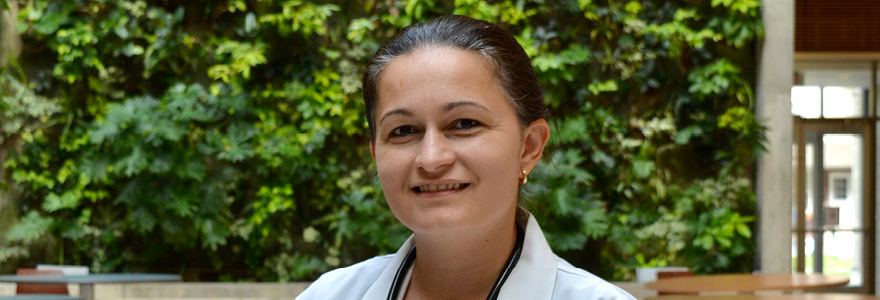Feature: Channeling the power of communication
By Alexandra Burza, MMJC'19
"Our decision, firm and dedicated
To become doctors: a noble profession
Long years of heads in our books
Clinical years of emotional turmoil
Oh yes you did not know
Their stories touched us, imprinted on our minds…"
Dr. Magbule Doko, MD’11, once welcomed incoming Windsor Campus students with these words, the opening stanza of her poem, “Nothing.”
The piece, like many others she has written, speaks to the complicated but essential physician-patient relationship they would soon come to understand.
“Writing was always my outlet, where I kind of process those emotions,” the Adjunct Professor shared, recalling how, as a student at Schulich Medicine & Dentistry, her mentors encouraged her to pursue narrative medicine after reading some of her work.
She’s since authored several blog posts and reflective pieces for the Canadian Medical Association Journal and other publications, as well as published a guidebook for post-partum care: Becoming a Mother: The First Six Weeks, offering her expertise as a medical doctor and mother of three.
Her passion for family medicine has stretched nearly as far back as her love of writing.
“I became interested when I was in high school, because one of my grandmothers was diagnosed with cancer. Then I decided that’s all I want to do,” Doko said. “Growing up in Windsor, we always heard about the need for family doctors, that there was a shortage. Even then, I was keeping newspaper clippings of these articles.”
True to her initial vision, Doko completed her residency at Schulich Medicine – Windsor Campus. In 2014, she began working in the community as a physician, and as faculty member at the School.
At that time, she was providing care at seven or eight different clinics throughout the region. Opening her own clinic in 2016 allowed Doko to become increasingly involved in teaching, and connect more meaningfully with her patients.
"You really take a holistic approach to your patient because you know them. They come in with a symptom, and you know their medical history, what’s going on with their life, and can tie those factors in to ask the right questions,” she said.
Earlier this year, Doko decided to operate a COVID-19 vaccination centre out of her clinic on Howard Avenue, administering more than 4,000 doses to Windsorites between May and early July. She saw an opportunity to create a learning experience for medical students, and invited them to volunteer at the vaccine clinic.
By the time the vaccines arrived, many of her patients had already received their doses. Doko turned to Twitter to spread awareness, yielding excellent results.
“Even Vaccine Hunters Canada shared my posts, and that received 130,000 views. I know a lot of local people found out about us on Twitter,” she said.
Doko says she received countless direct messages with questions about the vaccine and their particular circumstances.
“Posting something about vaccines has a bit more weight when it's coming from a physician. Especially during a pandemic, if we can educate people virtually we should.”
As the demand for vaccines in the community waned and the new academic year began, Doko has turned her attention to educating the medical learners of Windsor. This year, she is teaching clinical skills, introductory and advanced interviewing, and facilitating observerships for first- and second-year medical students in her clinic.
“I try to give them real examples from my own clinical experiences. By modelling my approach and discussing the results, I think the student is more likely to carry those skills forward. That’s what I remember most from my own teachers at Schulich Medicine, and I want the same for my students.”










